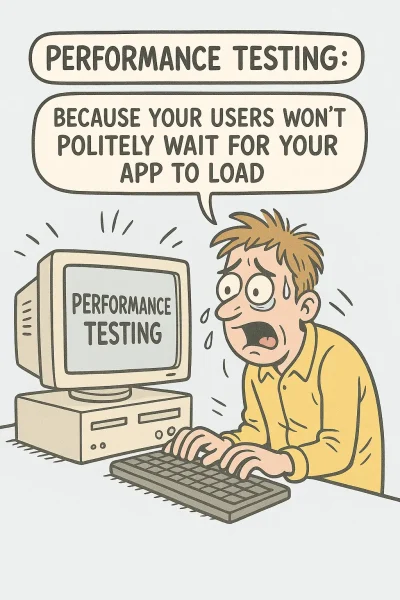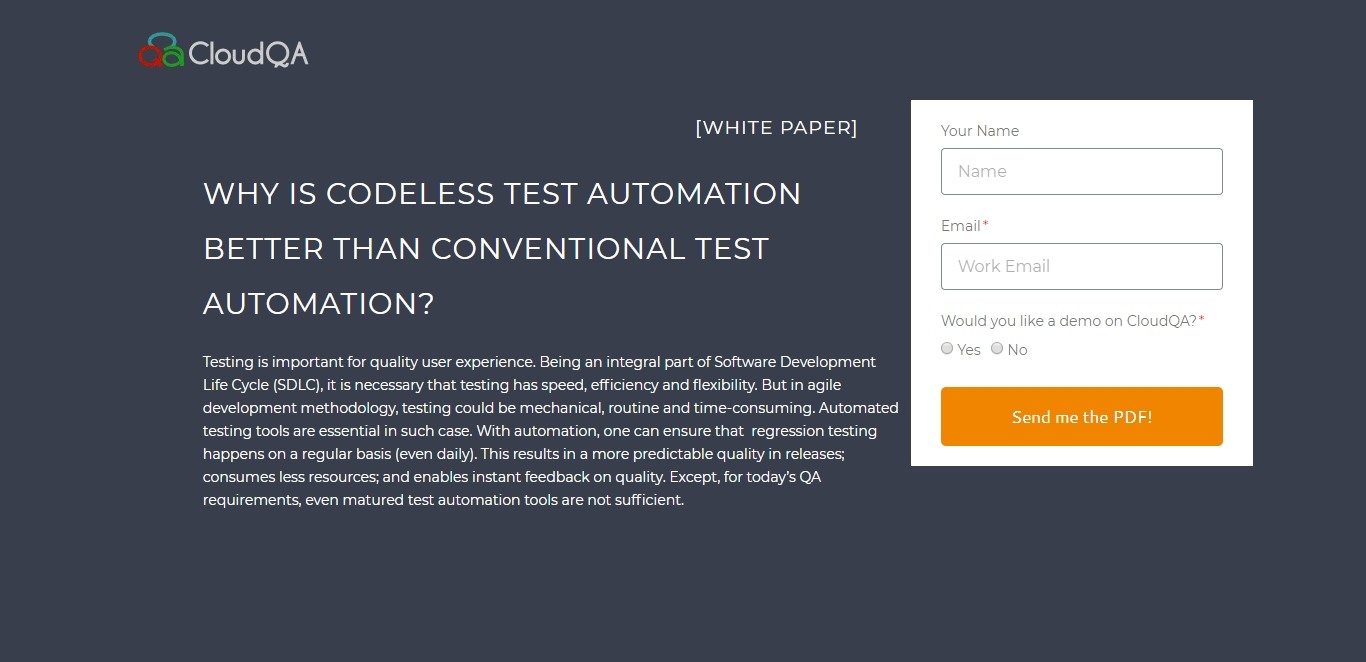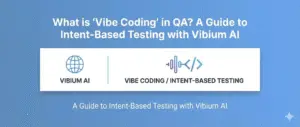Elevate Your SaaS Quality
Ensuring SaaS Excellence: A Triad of Testing and Intelligent Automation
In the competitive SaaS landscape, delivering a high-quality application is paramount. This necessitates a robust testing strategy that transcends basic checks. For complex SaaS solutions, particularly those laden with intricate forms and workflows, a powerful combination of functional regression, API testing, and performance evaluation is essential. Furthermore, the strategic integration of no-code/low-code test generation and parallel execution amplifies efficiency, ensuring rapid and reliable releases.
Functional Regression
Ensure that new updates do not disrupt existing functionality, safeguarding your application's reliability.
API Testing
API testing services validate the integrity and performance of your services to maintain seamless communication between components.
Performance Metrics
Analyze key performance indicators to ensure your applications meet user expectations under load.
The Bedrock: Functional Regression Testing

At its core, functional regression testing safeguards the integrity of your SaaS application’s established features. It rigorously verifies that existing functionalities remain operational after any code modifications or enhancements. This is particularly critical for complex applications where seemingly minor changes can have cascading effects. For form-heavy applications, regression testing ensures that data input, validation rules, and submission processes continue to function flawlessly across all forms.
Consider a sophisticated CRM platform: After deploying a new marketing automation module, functional regression testing would confirm that core functionalities like contact management, sales pipeline tracking, and reporting remain unaffected.
Now, for a data-intensive healthcare portal: Following an update to patient record forms, meticulous regression testing would validate that the entry, storage, and retrieval of diverse patient data fields remain consistent and accurate, without disrupting other essential features like appointment scheduling or billing.
Delving Deeper: The Synergistic Power of API Testing

API (Application Programming Interface) testing provides a granular view into the foundational communication layer of your SaaS ecosystem. It validates the interactions between disparate software components, microservices, and third-party integrations, ensuring seamless data exchange and robust functionality beneath the user interface. For complex applications with intricate internal architectures and form-heavy applications relying heavily on backend data processing, API testing is indispensable.
Consider a sophisticated CRM platform: After deploying a new marketing automation module, functional regression testing would confirm that core functionalities like contact management, sales pipeline tracking, and reporting remain unaffected.
Now, for a data-intensive healthcare portal: Following an update to patient record forms, meticulous regression testing would validate that the entry, storage, and retrieval of diverse patient data fields remain consistent and accurate, without disrupting other essential features like appointment scheduling or billing.
Beyond Functionality: The Imperative of Performance Evaluation

A functionally sound application that exhibits sluggishness or falters under load delivers a suboptimal user experience. Performance testing and the continuous monitoring of key performance indicators (KPIs) are crucial for gauging your SaaS application’s responsiveness, scalability, and stability under varying conditions. This is particularly vital for complex applications with resource-intensive processes and form-heavy applications handling substantial data volumes.
The Critical Role of Performance Metrics in Complex and Data-Driven SaaS:
- Pinpointing Performance Bottlenecks: Identifying areas within intricate workflows or data processing pipelines that impede application speed and responsiveness.
- Ensuring Scalability and Resilience: Validating the application’s capacity to handle anticipated user growth and peak load scenarios without performance degradation, especially crucial for data-intensive operations triggered by forms.
- Maintaining Optimal User Engagement: A responsive and efficient application directly contributes to user satisfaction and retention, particularly when dealing with complex tasks or lengthy data entry.
Intelligent Automation: The Efficiency Catalyst of No-Code/Low-Code
Traditional, script-intensive test automation can become a bottleneck, particularly when dealing with the intricate workflows of complex applications and the sheer volume of test cases required for form-heavy applications. No-code/low-code test generation platforms offer a paradigm shift, empowering a broader range of team members to create and maintain automated tests through intuitive visual interfaces.
The Strategic Advantages of No-Code/Low-Code for Complex and Form-Heavy SaaS Testing:
- Streamlined Test Authoring for Intricate Scenarios: Visually constructing test flows that mirror complex user journeys, simplifying the automation of multi-step processes and extensive form interactions.
- Reduced Maintenance Overhead for Dynamic UIs and Forms: Adapting tests to UI changes and modifications in form structures becomes significantly less cumbersome compared to code-based automation.
- Accelerated Test Development for Extensive Forms and Workflows: Rapidly building test cases that cover numerous form fields, validation rules, and complex business logic.
- Enhanced Collaboration and Domain Expertise Integration: Enabling subject matter experts with deep understanding of complex workflows and form requirements to directly contribute to test automation.
Amplifying Throughput: The Power of Parallel Test Execution
Sequential test execution can become a significant time constraint, especially for the extensive test suites required for complex and form-heavy applications. Parallel test execution mitigates this by concurrently running multiple tests across diverse environments and configurations, dramatically reducing overall testing time and accelerating feedback loops.
CloudQA: Orchestrating Comprehensive and Efficient SaaS Testing

CloudQA emerges as a unified platform that seamlessly integrates these critical testing facets. It empowers teams to effortlessly author and execute functional regression tests via a no-code interface, incorporate API testing directly within test workflows, continuously monitor performance metrics, and harness the velocity of parallel test execution.
With CloudQA, you can:
- Visually Model and Automate Complex User Journeys: Construct robust automated tests for intricate application flows and multi-faceted forms without the complexities of coding.
- Orchestrate Integrated API Testing: Validate the underlying architecture and data integrity of your complex and form-heavy applications by seamlessly incorporating API calls into your test scenarios.
- Proactively Monitor Application Performance: Gain actionable insights into the responsiveness and scalability of your application, identifying and addressing potential bottlenecks, especially under data-intensive operations.
- Minimize Test Maintenance Friction: Leverage intelligent features to adapt tests to evolving UI elements and form structures, reducing the burden of manual updates.
- Accelerate Feedback with Scalable Parallel Execution: Drastically reduce test execution times, enabling faster iteration cycles and quicker time-to-market for your complex and data-rich SaaS application.
In conclusion, ensuring the sustained quality and performance of complex and form-heavy SaaS applications demands a strategic and integrated testing paradigm. By embracing functional regression, API testing, performance evaluation, and the efficiency gains of no-code automation and parallel execution – all capabilities harmoniously provided by platforms like CloudQA – organizations can achieve accelerated release cadences, deliver exceptional user experiences, and maintain a competitive edge in the dynamic SaaS ecosystem.
RECENT POSTS
Guides

How To Select a Regression Testing Automation Tool For Web Applications
Regression testing is an essential component in a web application development cycle. However, it’s often a time-consuming and tedious task in the QA process.

Switching from Manual to Automated QA Testing
Do you or your team currently test manually and trying to break into test automation? In this article, we outline how can small QA teams make transition from manual to codeless testing to full fledged automated testing.

Why you can’t ignore test planning in agile?
An agile development process seems too dynamic to have a test plan. Most organisations with agile, specially startups, don’t take the documented approach for testing. So, are they losing on something?

Challenges of testing Single Page Applications with Selenium
Single-page web applications are popular for their ability to improve the user experience. Except, test automation for Single-page apps can be difficult and time-consuming. We’ll discuss how you can have a steady quality control without burning time and effort.

Why is Codeless Test Automation better than Conventional Test Automation?
Testing is important for quality user experience. Being an integral part of Software Development Life Cycle (SDLC), it is necessary that testing has speed, efficiency and flexibility. But in agile development methodology, testing could be mechanical, routine and time-consuming.






